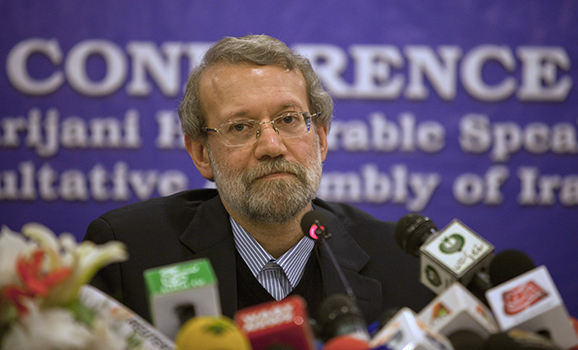On Oct. 19, Iran’s parliament speaker Ali Larijani said, “The parliament will approve the necessary rules regarding various nuclear activities if it feels that the world powers are behaving in an unacceptable manner,” signaling a more assertive role for parliament in the nuclear negotiations.
Larijani did not elaborate on what he meant by “various nuclear activities” and only vaguely discussed this issue. He then accused the United States of acting maliciously toward the Iranian people and the Muslim world, accusing it of “starting wars, oppressing the Palestinians, plundering the assets of the Muslims and forcing puppet dictators on them.”
He then warned the Iranian negotiation team and the parliament’s National Security Commission to stay alert for duplicitous behavior on the part of the world powers.
These statements by Larijani stood in stark contrast to the generally constructive comments he made earlier in Europe in October, when he said that he viewed the nuclear negotiations “positively.”
The question is: Why the sudden change in tone, and what does it mean?
One likely reason for Larijani’s new tone is that Supreme Leader Ayatollah Ali Khamenei or those close to him have asked the parliament to assume a more restrictive role in the nuclear negotiations. As Iran the United States continue to hold bilateral talks, the potential for an Iran-US rapprochement is becoming more likely, albeit still very difficult. The parliament may try to stop the process of normalizing relations with the United States, acting as a lever that brings West-friendly Foreign Minister Mohammad Javad Zarif back into a line that the Supreme Leader may feel more comfortable with.
The parliament has one major function in the nuclear negotiations: One of the major requests of five permanent members of the UN Security Council plus Germany (P5+1) may be that Iran sign on to additional protocols, a step that would need parliament’s approval.
It can be assumed that distinguishing and balancing between successful nuclear negotiations and preventing normalization of relations with the United States will be the two main and simultaneous tasks of parliament.
Larijani is uniquely suited to play this role, given his close relationship with Khamenei. A former nuclear negotiator himself, he has held important ministerial positions in Iran that are generally believed to require the blessing of the supreme leader. He is considered a pragmatic conservative within the Islamic Republic. This means he is not close to the Reformists, whom the supreme leader views with such suspicion, and is staunchly against the hard-liners aligned with former President Mahmoud Ahmadinejad, whom the supreme leader came to distrust in his second term as president. Thus, Larijani’s political history positions him to act mostly independently of other major political forces and movements outside Khamenei’s.
However, parliament itself is not united with respect to the nuclear negotiations and the Rouhani administration, and this has already caused trouble.
The majority faction, called “The Followers of Velayat,” headed by Ali Larijani, support the government in its plans for defusing tension with the West, improving the economy, resolving the nuclear issue without stepping over red lines such as normalization and creating political stability. Just as important, they also want to encourage the moderate Rouhani to lean toward the moderate Principalists. Larijani may issue warnings to the negotiators and step in when he feels it necessary, but he is aligned with the general approach of Rouhani’s administration so far.
The minority faction, however, has a negative view of Rouhani’s administration and expects it to fail in both its foreign and its internal policies. This faction, which is a subset of the radical Principalists, has substantial influence on the National Security and the Foreign Policy committee in the parliament. Members of this committee such as Ismail Kowsari denied before the UN General Assembly that Iran would ever negotiate with the United States, which he called “bloodthirsty.” He derisively called anyone who wanted to negotiate with the United States “a Reformist.” Essentially, this committee has become a tool of controlling and criticizing Zarif’s foreign policy approach, and it has already caused considerable damage to the foreign minister, who is in charge of the negotiations.
The National Security committee met with the foreign minister after the UN General Assembly meetings. Kayhan reported that Zarif said he agreed with the supreme leader that the telephone conversation between Rouhani and Obama was “inappropriate.” Zarif denied saying such a thing, and later checked into a hospital with severe back and leg pain from stress. The speaker of the committee, for his part, did not say what exactly had been discussed during this session. Zarif’s back pain was so severe that he attended a press conference at the nuclear negotiations in Geneva Oct. 16 in a wheelchair.
The second time the committee summoned the negotiators was after the session in Geneva. This time, Zarif could not participate, still suffering from back pain, and instead Deputy Foreign Minister Abbas Araghchi took his place. In this session, certain members criticized the decision to keep Iran’s proposal secret. However, Araghchi assured them that the red lines would not be crossed, and the negotiation team would not give up the nation’s right to nuclear technology.
For the time being, Khamenei has given his public support to the negotiations and resolving the nuclear file. If and when Iran and the P5+1 reach an agreement regarding Iran’s nuclear file and Iran is asked to sign additional protocols, Larijani and parliament can exert their influence. Given the relationship between Larijani and the supreme leader, this will be done in accordance with the Islamic Republic’s red lines and special concerns of the supreme leader and his interests.

